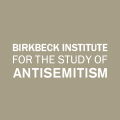The Institute is committed to the study of antisemitism across a wide range of disciplines. Being part of Birkbeck, University of London enables us to draw on an unparalleled combination of expertise in the study of antisemitism, racialization, racial and religious intolerance, multiculture, ethnicity and identity across the widest range of disciplines: history, politics, psychosocial studies, geography, English and humanities and law.
As a leading research university, students benefit from cutting-edge thinking by academics who are experts in their field.
Modules offered at Birkbeck include:
| Britannia’s Embrace: The British Empire and the World (BA) |
| Hate: On the Power of the Negative (BA) |
| ‘Race’, Ethnicity and Development (BA) |
| Racism and Antisemitism (BA) |
| The Politics of Race and Diaspora (BA) |
| Urban Multicultures (BA) |
| Antisemitism, Holocaust, Colonialism, Gender: Connecting the Conversations (MA) |
| Auschwitz in History and Memory (MA) |
| Culture, Community, Identity (MA) |
| The Holocaust (MA) |
| Modern Europe and Its Others: Jews, Muslims, Blacks (MA) |
| The Nazi Capture of Power (MA) |
| ‘Race’, Empire, Postcoloniality (MA) |
| Culture, Community, Identity (MSc) |
| Equality and the Law (MSc) |
| Race, Environment and International Development (MSc) |
An interdisciplinary postgraduate programme, ‘Culture, Diaspora, Ethnicity’, stretches across the social sciences and arts and humanities and is offered at certificate, diploma and MA levels. This programme explores debates on ‘race’ and racism, multiculture and postcoloniality; empire and the formation of modern Britain; contemporary transnational political communities, social identities and urban culture.

